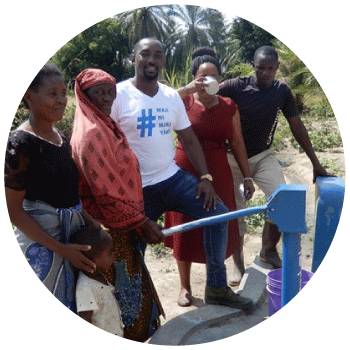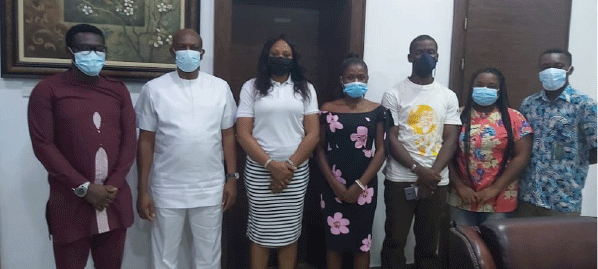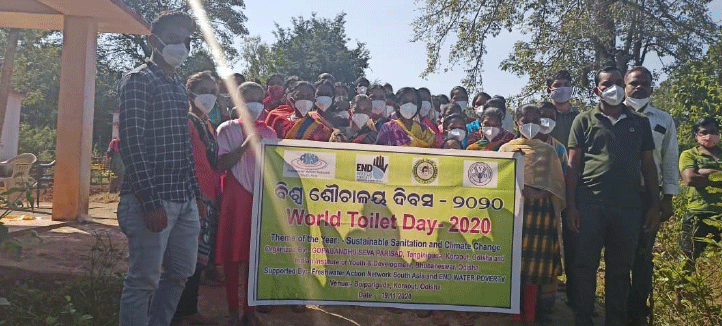The WASH Rights Network pose after meeting government officials
What is Claim Your Water Rights?
Claim Your Water Rights is a global public pressure campaign that aims to mobilise communities and civil society to demand their rights to water and sanitation from governments. Since launching in December 2019, our members have secured impressive results: from achieving legislative change in Pakistan and Nigeria to influencing governments’ Covid-19 interventions and supporting numerous communities to successfully claim their rights.
Is this campaign applicable to all water and sanitation related issues, worldwide?
Yes. Claim Your Water Rights allows our members to advocate on a range of different water and sanitation related issues – whether it’s affordability, disconnections, sanitation workers’ rights, debt cancellation, climate justice or privatisation. This means members can adapt their campaign approach to their local or national context while working in global solidarity under one banner.
What about sanitation?
We use the term ‘water rights’ as shorthand for ‘the human rights to water and sanitation’. Though most members focus on water-related issues, others give equal priority to sanitation. For example, the Indian Institute of Youth & Development organised rights awareness training for an Adivasi community in Koraput, Odisha. Following the training, the community filed a complaint to the National Scheduled Tribes Commission concerning a lack of toilets. A subsequent report showed that the money allocated for toilets had been spent despite no construction work taking place – the government simply assumed that the Adivasi community would not complain. When the commission received the complaint, the government immediately started constructing toilets.
The Indian Institute of Youth and Development hold World Toilet Day demonstrations
So how does the campaign work? What do civil society members do to claim rights?
Civil society can use a range of different accountability tools to support rights claiming. Our initial communication materials focused too heavily on lodging complaints to regulators and National Human Rights Institutions (NHRIs). NHRIs are responsible for promoting and monitoring the fulfilment of human rights at national level, but their effectiveness varies from country to country. We quickly tweaked our suggested campaign tactics to accommodate members working in countries without functioning human rights institutions or regulators.
Our members’ campaign tactics have been diverse: from mobilising communities or airing radio shows to informing people of their rights to lobbying government officials, conducting research, organising protests and even litigation. The more varied the tactics, the better. Whatever tactics members decide is the best in their context, we support. This includes unconditional backing to members who see confrontation as an effective way of achieving their advocacy aims. This backing is very important so members can really feel free to choose their own way.
So what is the role of End Water Poverty in this campaign?
Our primary role is to fund civil society members to conduct grassroots or national campaigns. We also offer guidance if required and convene monthly Claim Your Water Rights task team calls where we discuss how to improve the campaign. Another important role is amplifying our members’ work by organising webinars and sharing achievements through traditional or social media.
Can you share an example of where this campaign led to the advancement of the human rights to water and sanitation in practice?
I can share more than one!
Our first major success came in Zambia. In January 2020, Vision Africa Regional Network supported over 1,000 people who had been without safe water for almost a year to successfully demand their rights from their member of parliament, following TV interviews with disgruntled residents and threats to lodge complaints to Zambia’s human rights commission.
Center for Law and Justice (CLJ) used Claim Your Water Rights to advance their campaign for the safety, dignity and wellbeing of sanitation workers in Pakistan. In June 2020, the Punjab Assembly passed a historic resolution recognising sanitation workers as “frontline heroes in the fight against Covid”. The Pakistan Supreme Court then ordered provincial and federal governments to provide safety kits to workers.
Our most recent success came in Nigeria with the passing into law of the Enugu Water Bill. The bill stipulates that people have a right to water and that this right is to be enforced by an independent regulator. This came after months of patient, persistent lobbying by the WASH Rights Network.
These are just a couple of examples – we recently celebrated the second anniversary of Claim Your Water Rights by gathering members’ campaign highlights into one very colourful Twitter mega-thread!



